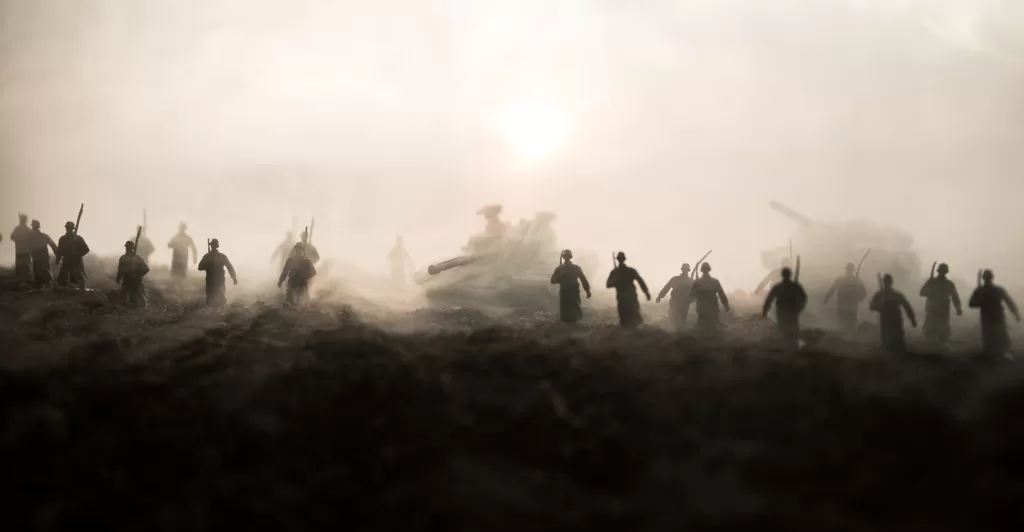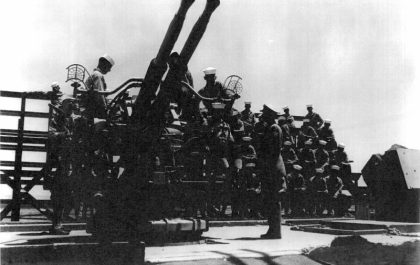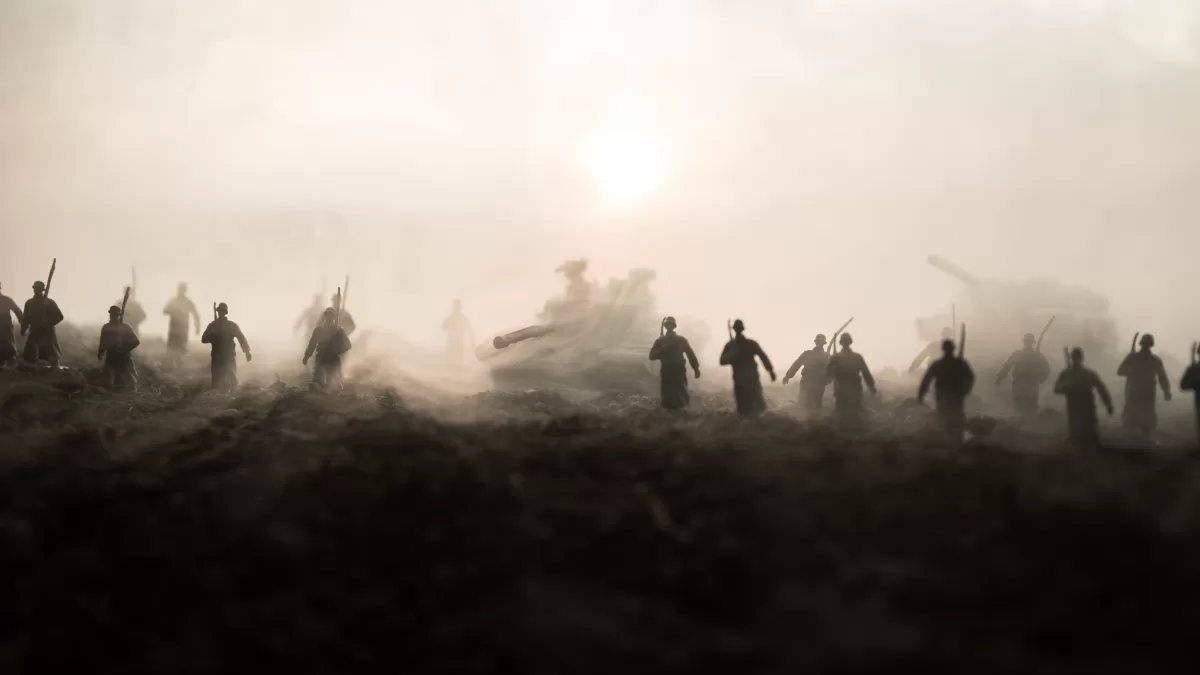The Coastwatchers chronicles the adventures of James Ellis Anderson, a young boy from Illinois sent to live with his eccentric aunt in Malibu during WWII. In the tradition of fiction from that period, TNT is presenting this original story by TNT Editor Suzanne Guldimann in serial installments. The first chapter, which introduces James and his Aunt Maddie, debuted in our November 4, 2022 issue and is available online. Please join us, as we travel back in time to 1942.

Bang! Bang, bang, bang! We found out where the anti aircraft guns were located early on a Saturday morning in February. They went off with a sound like an Illinois thunderstorm, the kind where the lightning is right overhead. Mouse, who had been purring peacefully on my stomach, sprang into the air and vanished under my bed. I secretly wished I could join him. The explosions shook the whole house.
“I think it’s OK, James,” Aunt Maddie shouted at me, putting a steadying arm around me as I rushed into the hall and nearly collided with her. “The sound is coming from behind us, not from the ocean, and I didn’t hear the air raid siren.”
The noise was unrelenting and unbearable, like a headache. And then, suddenly, it was over.
Aunt Maddie rushed out to check on the horses—we could hear them whinnying in fear. I followed her, afraid all the time that we were under attack but wanting to help if I could.
It took some time to soothe and calm the animals. The horses remained spooked, but the goats soon settled down to breakfast. Mr Calzado found us there.
It turned out that the newest anti aircraft installation was on the ridge of the peak just west of our house—no wonder it was loud! Mr Calzado had talked to the neighbor’s gardener, who heard from the other neighbor’s housekeeper, that there was a detail of soldiers stationed on the mountain, and that they had just finished installing the big guns. There were more, all up and down the coast, hidden on the sides of canyons or among the rock formations on the ridge tops, but this one was almost on top of us.
We weren’t the only ones rattled. You might have thought that having the big guns as part of the coastal defense would make people feel better. It didn’t.
Mr Lawrence, Jessie’s father, stopped by the next day and told us that the lady with the housekeeper had hysterics—it’s hard to blame her, because that house was even closer to the guns—and that the only way she agreed to stay was if her husband built a bomb shelter. Mr Lawrence knew everyone and all of the news.
Mr Lawrence was in the habit of stopping by on Sunday afternoons. He looked like a stouter and more cheerful Orson Welles. He was jovial and friendly and loved to talk. Jessie got her dark hair from him and his quick intelligence and temper. He reminded me of a dragonfly—always in motion, restlessly drifting around the room. Sometimes Mr Zelle would stop in, too—a quiet, gentle brooding presence, and there were others. There was a pretty lady named Amanda who was a friend of Aunt Maddie’s. I liked her because she always treated me like a person. My favorite was a friend of Aunt Maddie’s who lived down on the beach at the Malibu Colony. Her name was Mrs Alice Browning. She looked completely ordinary—nice, but ordinary—but she had been a movie actress back in the silent days and before that she traveled with a circus. She had wonderful stories and could still do magic tricks. Really good ones.
Mrs Browning didn’t come very often because she was in charge of the Malibu Women’s Emergency Unit and she was always busy organizing first aid classes and Red Cross casualty stations, and fundraising for the troops and finding transportation for them and housing. The mountains were so big, and so many miles long, and there weren’t enough people, and volunteers kept quitting, she said.
The war was on everyone’s minds. Amanda was worried that her husband, a writer like Maddie who was working on a project in New York, would be called up to fight. Mr Lawrence was anxious about his son. I learned that Mr Zelle’s wife and son were in Switzerland, safe for the moment at least, but there was no word from the rest of his family in Germany and he feared the worst.
They talked about rationing. Rubber for tires and shoes and even for ladies’ corsets was already in short supply—Aunt Charlotte would have been scandalized to hear a room full of people talking about ladies’ underwear, but no one there seemed to care or think it was inappropriate. Automobiles were next on the list for rationing—the plants were being taken over to produce Jeeps and things for the military. There were rumors that coffee, tea, and sugar would soon be rationed, too.
They talked about places I’d only ever heard about in adventure stories: Borneo and the East Indies, and Singapore, and the Philippines, where fighting was going on. They talked about whether an attack on the West Coast was really imminent, or whether the allies could take back France from the Nazis. They talked about how the war was affecting the movie industry, and life in New York, and Los Angeles, and Malibu. They talked and talked and talked.
Aunt Maddie mostly listened—she had a gift for that—but she also guided the conversation, directing it back when it strayed away from the topic, and ensuring that everyone had an opportunity to participate, even me. Jessie didn’t have much patience with what she called Aunt Maddie’s “mad tea parties,” but I liked to listen and l learned a lot of things. I started reading the Los Angeles Times every morning to try and keep up.
Those conversations made me realize for the first time how small the world was, and how fragile, and how fast things were changing; but the war wasn’t everything. It loomed in the background, but mostly life was ordinary things.
School and the Coastwatchers kept me busy, but I found time to sit for hours and listen to Aunt Maddie’s collection of records while I read, or wrote, or did my homework, or just daydreamed—Aunt Maddie never told me to get my head out of the clouds or keep my feet on the ground the way Father and Aunt Charlotte always did.
On one of my first Sundays in Malibu I asked Aunt Maddie about church, thinking about my Father and Aunt Charlotte, and how important it was to them that I go to Sunday school every week.
“I’m not much of a churchgoer, my lad,” Aunt Maddie said. “If you would like to go, you can go with Jesse.”
I knew Father would approve, so I said yes. The problem was, Jessie’s family was Catholic and I had always gone to the Lutheran church. Church in Malibu was at the little brick county courthouse: Methodist services at 8 a.m., Presbyterian at 9 a.m., Catholic at 10 a.m.
“What happens if you go to the wrong service?” I asked.
“You ask Father O’Malley to forgive you for your sins,” Jessie said.
I felt guilty about it, but I never went.
Sometimes Jessie and I helped Kitty with her chores on her family’s farm, and were rewarded with baskets of the first strawberries of the season, red, and sweet, right from the field. No strawberries had ever tasted as good as those.
Sometimes the three of us would go for walks on the beach or in the hills. When she had time, Aunt Maddie took me riding. It was a dry winter that year, and the parched hills smelled of dust and sage. She took me once to see Indian rock art—black and red spirals and geometric shapes at the back of a sandstone cave, and to look for fossils, fragments of huge iridescent oyster shells, and delicate stone spirals.
Aunt Maddie laughed when I asked if the neat spirals were the horns of dinosaurs.
“Just humble sea snails,” she said. “Although they always remind me of the horns of unicorns,”
I still have one of the fossil shells I brought home, a perfect turritella, whorled and pointed like a unicorn’s horn. It’s more than just a curiosity, it’s a reminder of that strange time.
We never got used to the artillery drills, and the blackout orders that began to accompany them, but they became part of our lives. The war was always present, a grim backdrop that made the colors of life more vivid, but left all of us—not just the lady who wanted to build the bomb shelter—with a perpetual feeling of dread, a feeling that continued to grow.





